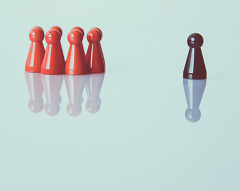Responding to Anti-Asian Racism During the COVID-19 Outbreak
Responding to Anti-Asian Racism During the COVID-19 Outbreak

Major crises raise people’s concern for personal safety and heighten anxiety. One effect of this heightened anxiety is that it can intensify bias and discrimination as we start focusing our attention on our own well-being. Throughout the COVID-19 crisis many individuals, particularly those from East Asian backgrounds, are reporting more experiences of racism and xenophobia. We write to highlight ways to respond if you are experiencing bias and discrimination or if you are an ally who wants to support them.
East Asian individuals have been unfairly targeted for discrimination and bias partially due to the virus first being identified in Wuhan, China. The disease was initially termed the “Wuhan coronavirus,” and still referred to by some as the “Chinese virus,” terms that closely associate Chinese communities with the virus. Racialization is a process by which all individuals from a certain background are grouped together due to perceived biological characteristics. Because of racialization, anyone with an East Asian background has become associated with the virus. Moreover, using this terminology ignores the national and international political, economic, and healthcare systems that contributed to the virus becoming a pandemic and concern for all people.
Historical and present contexts place individuals from East Asian backgrounds at greater risk of discrimination. Historically, East Asian communities have been the target of health-related attacks on their culture, especially with regard to food (for further context, please see the footnote below).
Presently, Asian individuals have been unfairly targeted by being accused of having COVID-19 when expressing normal, non-illness related coughing or sneezing and when demonstrating symptoms of a common cold or seasonal flu. In addition, East Asian individuals have been more likely to experience negative consequences of showing symptoms, such as “victim blaming” and accusing the culture as the reason for the disease, experiencing racialized violence when showing symptoms, such as slurs or glares, and being removed from public spaces (e.g., asking them to leave classrooms, workplaces).
If you have been the victim of racism, some suggestions for you to cope include:
-Recognize experiences of racism are real and not you being “oversensitive” Racism is a persistent social problem, and if you feel you have been targeted by prejudice and discrimination, it is important to recognize that these are real issues that take a toll on your physical and mental wellbeing. You can also emphasize taking moments to care for yourself and others when hurt by discrimination and remember that you have the right to be seen, welcomed, supported, served, and helped.
-Recognize the strength of your communities and reject attacks on your values. Communities of color and immigrants hold many strengths, including the strengths of your cultural values and social contributions. Identify and elect to receive information sources and communities that offer accurate, sensitive information on the outbreak.
-Hold together in solidarity. Supporting one another can help your communities utilize their strengths in the face of racism. During these times, racist individuals and systems may attempt to drive your communities apart, holding some actions and communities as “better” (e.g., the “Model Minority”) while rejecting others. Find ways to connect when practicing social distancing, such as through social media groups and other virtual communities. Stand together in the fight against racism to anyone.
-Connect to resources from your community. Sharing and utilizing resources, such as the one linked here, can help you find support from others experiencing similar struggles. These psychologists offer other suggestions for communal support.
Racism is an issue we must all address, not just individuals engaging in racist acts and the victims of racism. Thus, those of us who aren’t being targeted can support those facing discrimination by:
-Calling out racist comments and acts when you see them. This can feel uncomfortable if you are not used to doing this, but saying something like, “This virus is not connected to a country or a specific group of people - calling it that puts Asian people at risk and is unnecessarily harmful” can be helpful. Online, you can provide links to accurate information, and report the comments to moderation staff.
-Interrupt racism, such as by creating distance between the person making racist comments or actions and the victim. This can look like physically or verbally distracting or blocking those using slurs, as you feel you are able to safely do so.
-Notice when you have engaged in actions that maintain discrimination and prejudice. Silence and inaction, such as not doing anything when someone uses a slur or makes a racist joke, maintains the racism by allowing unjust and discriminatory actions and systems to continue.
If you notice you have acted in a harmful way, find ways to apologize without excusing your actions (or inactions), and make personal commitments to correct the situation individually and engage in social action.
-Offer support to individuals facing discrimination and ask permission to act on their behalf. This can look like offering to speak to others about the discrimination or to write letters or report the discrimination. It can also involve listening to people expressing their pain and hurt and making sure to validate that pain and the reality and injustice of their racist experiences.
-Support Asian communities economically and socially. This includes but is not limited to donating to local community and mutual aid organizations, as well as shopping at businesses owned by Asians, especially restaurants (both now and in the future), which have been particularly vulnerable to health-related attacks. Ordering take-out from Chinese-restaurants is one concrete way to counter this injustice.
-Find ways to connect to the sense of caring and concern for others you feel now and create reminders for continuing to help later. This may include: practicing empathy for all, educating those in your social circles, posting relevant articles on social media, remembering that it is especially important to also be caring for yourself physically and mentally, and remembering these perspectives when this immediate crisis is over.
----------------------------------------
Footnote: It’s helpful to understand the context in which this racism occurs. Disease naming has no rhyme or reason – Swine flu emerged in Mexico, Mad Cow disease in the United Kingdom, and the “Spanish flu” has been believed by researchers to not have emerged in Spain at all – the name arose out of how reports could be published during World War I. Continuing to use the “Wuhan coronavirus” or “Chinese virus” designation only serves to further bias and discrimination, and ignores the national and international political, economic, and healthcare systems that contributed to the virus becoming a pandemic and concern for all people.
Moreover, health-related attacks on Asian communities are not new. Asian communities have been historically targeted with health-related attacks, from attacks on the Asian food industry for false reports of the use of “questionable” sources of meat and the use of MSG as an “unhealthy” food additive.
















